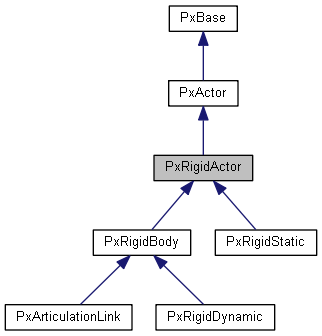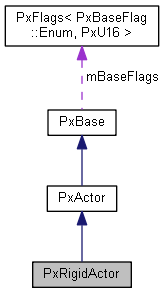 |
 |
PxRigidActor represents a base class shared between dynamic and static rigid bodies in the physics SDK. More...
#include <PxRigidActor.h>


Public Member Functions | |
| virtual void | release ()=0 |
| Deletes the rigid actor object. More... | |
Global Pose Manipulation | |
| virtual PxTransform | getGlobalPose () const =0 |
| Retrieves the actors world space transform. More... | |
| virtual void | setGlobalPose (const PxTransform &pose, bool autowake=true)=0 |
| Method for setting an actor's pose in the world. More... | |
Shapes | |
| virtual bool | attachShape (PxShape &shape)=0 |
| virtual void | detachShape (PxShape &shape, bool wakeOnLostTouch=true)=0 |
| virtual PxU32 | getNbShapes () const =0 |
| Returns the number of shapes assigned to the actor. More... | |
| virtual PxU32 | getShapes (PxShape **userBuffer, PxU32 bufferSize, PxU32 startIndex=0) const =0 |
| Retrieve all the shape pointers belonging to the actor. More... | |
 Public Member Functions inherited from PxActor Public Member Functions inherited from PxActor | |
| virtual PxActorType::Enum | getType () const =0 |
| Retrieves the type of actor. More... | |
| virtual PxScene * | getScene () const =0 |
| Retrieves the scene which this actor belongs to. More... | |
| virtual void | setName (const char *name)=0 |
| Sets a name string for the object that can be retrieved with getName(). More... | |
| virtual const char * | getName () const =0 |
| Retrieves the name string set with setName(). More... | |
| virtual PxBounds3 | getWorldBounds (float inflation=1.01f) const =0 |
| Retrieves the axis aligned bounding box enclosing the actor. More... | |
| virtual void | setActorFlag (PxActorFlag::Enum flag, bool value)=0 |
| Raises or clears a particular actor flag. More... | |
| virtual void | setActorFlags (PxActorFlags inFlags)=0 |
| sets the actor flags More... | |
| virtual PxActorFlags | getActorFlags () const =0 |
| Reads the PxActor flags. More... | |
| virtual void | setDominanceGroup (PxDominanceGroup dominanceGroup)=0 |
| Assigns dynamic actors a dominance group identifier. More... | |
| virtual PxDominanceGroup | getDominanceGroup () const =0 |
| Retrieves the value set with setDominanceGroup(). More... | |
| virtual void | setOwnerClient (PxClientID inClient)=0 |
| Sets the owner client of an actor. More... | |
| virtual PxClientID | getOwnerClient () const =0 |
| Returns the owner client that was specified with at creation time. More... | |
| virtual PxAggregate * | getAggregate () const =0 |
| Retrieves the aggregate the actor might be a part of. More... | |
 Public Member Functions inherited from PxBase Public Member Functions inherited from PxBase | |
| virtual const char * | getConcreteTypeName () const =0 |
| Returns string name of dynamic type. More... | |
| template<class T > | |
| T * | is () |
| template<class T > | |
| const T * | is () const |
| PX_FORCE_INLINE PxType | getConcreteType () const |
| Returns concrete type of object. More... | |
| PX_FORCE_INLINE void | setBaseFlag (PxBaseFlag::Enum flag, bool value) |
| Set PxBaseFlag. More... | |
| PX_FORCE_INLINE void | setBaseFlags (PxBaseFlags inFlags) |
| Set PxBaseFlags. More... | |
| PX_FORCE_INLINE PxBaseFlags | getBaseFlags () const |
| Returns PxBaseFlags. More... | |
| virtual bool | isReleasable () const |
| Whether the object is subordinate. More... | |
Constraints | |
| virtual PxU32 | getNbConstraints () const =0 |
| Returns the number of constraint shaders attached to the actor. More... | |
| virtual PxU32 | getConstraints (PxConstraint **userBuffer, PxU32 bufferSize, PxU32 startIndex=0) const =0 |
| Retrieve all the constraint shader pointers belonging to the actor. More... | |
| PX_INLINE | PxRigidActor (PxType concreteType, PxBaseFlags baseFlags) |
| PX_INLINE | PxRigidActor (PxBaseFlags baseFlags) |
| virtual | ~PxRigidActor () |
| virtual bool | isKindOf (const char *name) const |
| Returns whether a given type name matches with the type of this instance. More... | |
Additional Inherited Members | |
 Public Attributes inherited from PxActor Public Attributes inherited from PxActor | |
| void * | userData |
| user can assign this to whatever, usually to create a 1:1 relationship with a user object. More... | |
 Protected Member Functions inherited from PxActor Protected Member Functions inherited from PxActor | |
| PX_INLINE | PxActor (PxType concreteType, PxBaseFlags baseFlags) |
| PX_INLINE | PxActor (PxBaseFlags baseFlags) |
| virtual | ~PxActor () |
 Protected Member Functions inherited from PxBase Protected Member Functions inherited from PxBase | |
| PX_INLINE | PxBase (PxType concreteType, PxBaseFlags baseFlags) |
| Constructor setting concrete type and base flags. More... | |
| PX_INLINE | PxBase (PxBaseFlags baseFlags) |
| Deserialization constructor setting base flags. More... | |
| virtual | ~PxBase () |
| Destructor. More... | |
| template<class T > | |
| bool | typeMatch () const |
 Protected Attributes inherited from PxBase Protected Attributes inherited from PxBase | |
| PxType | mConcreteType |
| PxBaseFlags | mBaseFlags |
PxRigidActor represents a base class shared between dynamic and static rigid bodies in the physics SDK.
PxRigidActor objects specify the geometry of the object by defining a set of attached shapes (see PxShape).
|
inlineprotected |
|
inlineprotected |
|
inlineprotectedvirtual |
|
pure virtual |
attach a shared shape to an actor
This call will increment the reference count of the shape.
Attaching a triangle mesh, heightfield or plane geometry shape configured as eSIMULATION_SHAPE is not supported for non-kinematic PxRigidDynamic instances.
Sleeping: Does NOT wake the actor up automatically.
| [in] | shape | the shape to attach. |
Referenced by PxRigidActorExt::createExclusiveShape().
|
pure virtual |
detach a shape from an actor.
This will also decrement the reference count of the PxShape, and if the reference count is zero, will cause it to be deleted.
Sleeping: Does NOT wake the actor up automatically.
| [in] | shape | the shape to detach. |
| [in] | wakeOnLostTouch | Specifies whether touching objects from the previous frame should get woken up in the next frame. Only applies to PxArticulation and PxRigidActor types. |
|
pure virtual |
Retrieve all the constraint shader pointers belonging to the actor.
You can retrieve the number of constraint shader pointers by calling getNbConstraints()
Note: Removing constraint shaders with PxConstraint::release() will invalidate the pointer of the released constraint.
| [out] | userBuffer | The buffer to store the constraint shader pointers. |
| [in] | bufferSize | Size of provided user buffer. |
| [in] | startIndex | Index of first constraint pointer to be retrieved |
|
pure virtual |
Retrieves the actors world space transform.
The getGlobalPose() method retrieves the actor's current actor space to world space transformation.
Referenced by PxShapeExt::getGlobalPose().
|
pure virtual |
Returns the number of constraint shaders attached to the actor.
You can use getConstraints() to retrieve the constraint shader pointers.
|
pure virtual |
Returns the number of shapes assigned to the actor.
You can use getShapes() to retrieve the shape pointers.
|
pure virtual |
Retrieve all the shape pointers belonging to the actor.
These are the shapes used by the actor for collision detection.
You can retrieve the number of shape pointers by calling getNbShapes()
Note: Removing shapes with PxShape::release() will invalidate the pointer of the released shape.
| [out] | userBuffer | The buffer to store the shape pointers. |
| [in] | bufferSize | Size of provided user buffer. |
| [in] | startIndex | Index of first shape pointer to be retrieved |
|
inlineprotectedvirtual |
Returns whether a given type name matches with the type of this instance.
Reimplemented from PxActor.
Reimplemented in PxRigidBody, PxRigidDynamic, PxArticulationLink, and PxRigidStatic.
References PxActor::isKindOf().
Referenced by PxRigidStatic::isKindOf(), and PxRigidBody::isKindOf().
|
pure virtual |
Deletes the rigid actor object.
Also releases any shapes associated with the actor.
Releasing an actor will affect any objects that are connected to the actor (constraint shaders like joints etc.). Such connected objects will be deleted upon scene deletion, or explicitly by the user by calling release() on these objects. It is recommended to always remove all objects that reference actors before the actors themselves are removed. It is not possible to retrieve list of dead connected objects.
Sleeping: This call will awaken any sleeping actors contacting the deleted actor (directly or indirectly).
Calls PxActor::release() so you might want to check the documentation of that method as well.
Implements PxActor.
Implemented in PxArticulationLink.
|
pure virtual |
Method for setting an actor's pose in the world.
This method instantaneously changes the actor space to world space transformation.
This method is mainly for dynamic rigid bodies (see PxRigidDynamic). Calling this method on static actors is likely to result in a performance penalty, since internal optimization structures for static actors may need to be recomputed. In addition, moving static actors will not interact correctly with dynamic actors or joints.
To directly control an actor's position and have it correctly interact with dynamic bodies and joints, create a dynamic body with the PxRigidBodyFlag::eKINEMATIC flag, then use the setKinematicTarget() commands to define its path.
Even when moving dynamic actors, exercise restraint in making use of this method. Where possible, avoid:
Sleeping: This call wakes dynamic actors if they are sleeping and the autowake parameter is true (default).
| [in] | pose | Transformation from the actors local frame to the global frame. Range: rigid body transform. |
| [in] | autowake | whether to wake the object if it is dynamic. This parameter has no effect for static or kinematic actors. If true and the current wake counter value is smaller than PxSceneDesc::wakeCounterResetValue it will get increased to the reset value. |